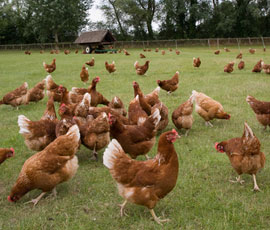‘Free-range meat and eggs better for you’

Meat and eggs from birds reared in higher welfare systems are also better nutritionally, Compassion in World Farming has claimed in a new report.
Based on an extensive literature review, the study says that free-range and organic chicken typically have between 8% and 49% less fat than intensively-farmed birds.
“Fat content of chickenmeat is also lower for slower-growing genotypes compared with fast-growing genotypes,” it adds.
CIWF also looks at the proportion of omega-3 fatty acid in poultry and concludes that it “tends to be higher in chicken meat from free-range systems compared with indoor systems”.
The report also shows that male birds from layer breeds also have significantly higher levels of long-chain omega-3 in their meat.
“It is standard practice to kill these male chicks post hatching,” it says. “Creating a premium market for these birds based on the nutritional qualities of the meat would be highly desirable from an ethical point of view.”
“An urgent move from intensive to higher welfare farming is required to improve animal welfare, and in doing so, contributing to improved nutrition.”
Emily Lewis-Brown
But the CIWF report also concedes that differences in fat content and omega-3 levels “are not consistent across all studies”, while there may be shortcomings arising from differences in methodology between studies.
“In many cases, it is difficult to determine whether differences in nutritional content are a result of the system per se, or a result of the differing ages of the animal being compared.”
It also adds that “the actual level of welfare attained in any production system is dependent on the level of management skill applied”.
The report also covers eggs and, while there was no difference in fat content between free-range and cage egg, there was a clear elevation of omega-3 in free-range eggs, ranging from 26% to 170%.
The report also suggests that free-range eggs can have up to 100% more Vitamin E, and 280% more beta-carotene – antioxidants that are thought to reduce the risk of heart disease and cancer.
“An urgent move from intensive to higher welfare farming is required to improve animal welfare, and in doing so, contributing to improved nutrition,” said CIWF research manager Emily Lewis-Brown.
